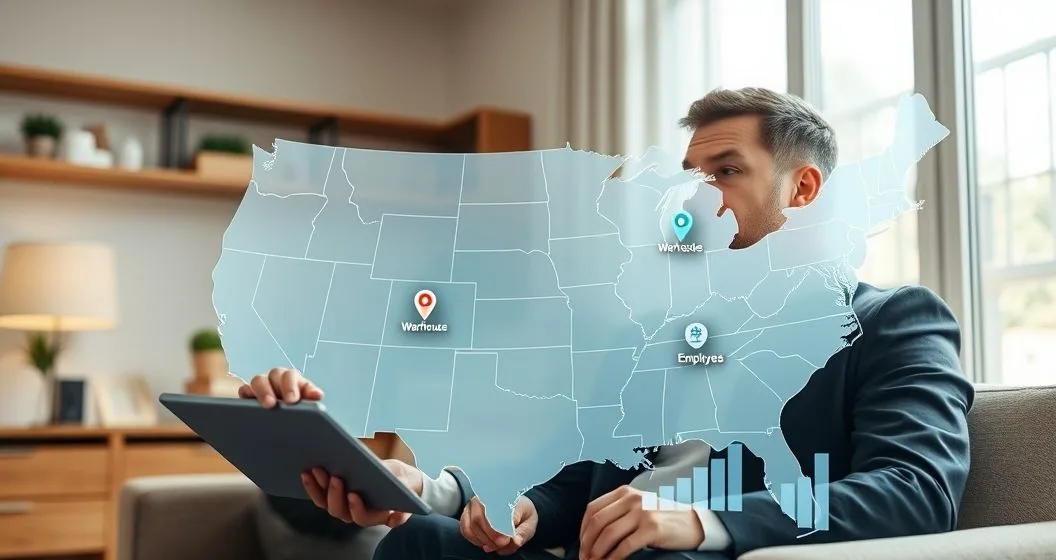Overview
Since the Supreme Court’s decision in South Dakota v. Wayfair, Inc. (2018), most U.S. states can require remote sellers to collect sales tax when the seller has sufficient connection — or “nexus” — to the state. That connection now commonly includes economic activity, not only a traditional physical presence (see the Wayfair opinion: https://www.supremecourt.gov/opinions/17pdf/17-494_h315.pdf).
Key nexus tests states use
- Physical presence: Having offices, retail locations, employees, independent contractors, or inventory stored in the state creates clear nexus. States enforce this through audits and registration requirements.
- Economic nexus: Many states set a dollar or transaction threshold (for example, $100,000 in sales or 200 transactions; thresholds vary by state). When a remote seller exceeds that threshold, the state can require registration and collection. Check each state’s revenue site for current thresholds.
- Marketplace facilitator laws: In most states, marketplaces (Amazon, Etsy, etc.) are required to collect and remit sales tax on behalf of third‑party sellers. The seller may still have separate nexus obligations depending on other activities. See our guide on marketplace rules for sellers: Understanding State Sales Tax on Marketplace Facilitators (https://finhelp.io/glossary/understanding-state-sales-tax-on-marketplace-facilitators/).
- Affiliate/click‑through nexus and marketplace collection: Some states use affiliate links or referral relationships to establish nexus; others focus on where orders are sourced or fulfilled (dropshipping rules can complicate this).
Practical examples (realistic, not exhaustive)
- An online retailer in Ohio stores inventory in a third‑party fulfillment center in Texas. That inventory generally creates physical nexus in Texas and triggers registration for Texas sales tax.
- A seller in Florida who ships $250,000 of goods to customers in California in a year may meet California’s economic nexus standard and must register, collect, and remit California sales tax.
Action checklist to stay compliant
- Inventory your activities by state: employees, contractors, inventory, trade shows, and fulfillment centers.
- Monitor sales and transaction volumes by state using accounting or sales-tax software to detect when you cross thresholds.
- Register and collect promptly when nexus is triggered — voluntary registration can reduce penalties compared with waiting for an audit.
- Keep clear records of exempt sales and resale certificates; obtain and store exemption documentation where required.
- Consider using a tax engine or a sales-tax specialist for multistate operations.
In my practice advising e-commerce clients, the most common gap I see is poor tracking of where sales are sourced and where inventory is located. Implementing an automated tracking system early prevents surprises and reduces audit risk.
Common mistakes to avoid
- Assuming marketplace platforms always relieve you of registration duties — marketplaces collect for many states, but seller responsibilities can remain, especially for services or bundled products.
- Ignoring small or infrequent trips to a state (trade shows or contract work) that can create physical presence.
- Failing to collect and retain exemption certificates for resale or exempt organizations.
Resources and authoritative references
- South Dakota v. Wayfair, Inc., 585 U.S. ___ (2018): Supreme Court opinion (https://www.supremecourt.gov/opinions/17pdf/17-494_h315.pdf).
- Federation of Tax Administrators — state tax information and links (https://www.taxadmin.org).
- Streamlined Sales Tax Governing Board — resources on simplified and multistate compliance (https://www.streamlinedsalestax.org).
Further reading on FinHelp
- Multistate Sales Tax Basics for Online Sellers: https://finhelp.io/glossary/multistate-sales-tax-basics-for-online-sellers/
- Understanding State Sales Tax on Marketplace Facilitators: https://finhelp.io/glossary/understanding-state-sales-tax-on-marketplace-facilitators/
- State Sales Tax Nexus: Practical Tests for Remote Sellers in 2025: https://finhelp.io/glossary/state-sales-tax-nexus-practical-tests-for-remote-sellers-in-2025/
Professional disclaimer
This article is educational and does not constitute legal or tax advice. For specific guidance about your business’s nexus and filing obligations, consult a licensed tax advisor or state revenue department.



